When it comes to maintaining a pristine lawn, the choice of a zero-turn mower can greatly influence the ease and efficiency of the task. Cub Cadet and John Deere are two of the leading brands in this competitive arena, each with their own set of strengths. As you explore options for your landscaping needs, understanding the intricacies of these mowers will ensure you make an informed decision. The Cub Cadet is renowned for its cutting-edge features and ergonomic designs, while John Deere boasts a legacy of durability and performance.
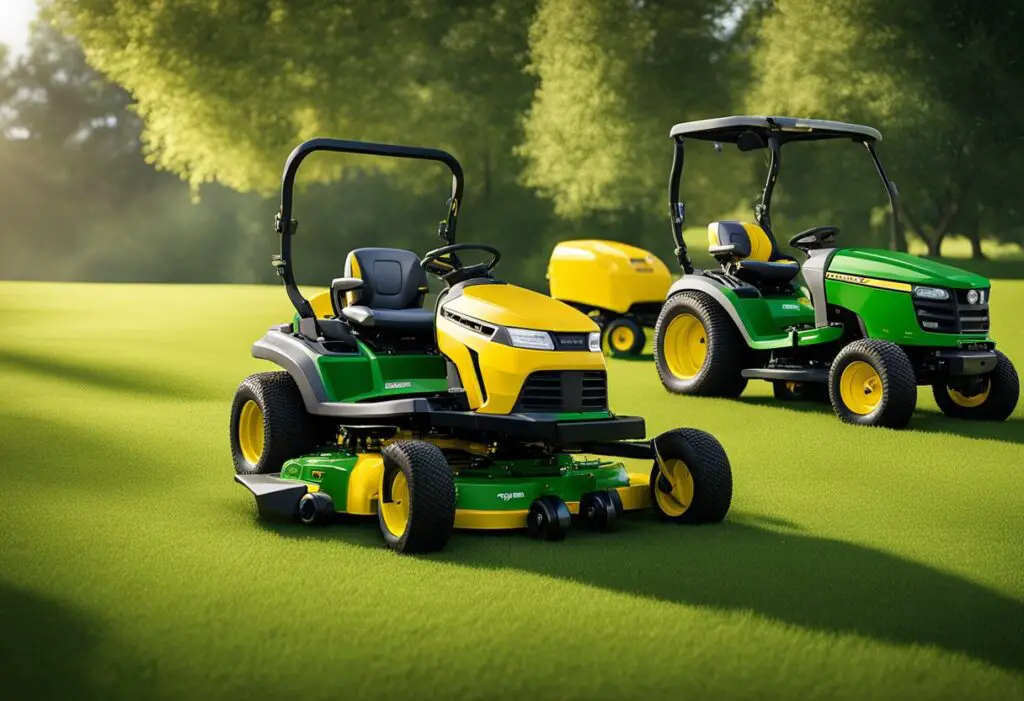
To make the best choice, consider the different models each brand offers, their performance capabilities, and how they align with the demands of your lawn. From the power under the hood to the precision of the cut, comparing these aspects will guide you toward the mower that not only fits your budget but also exceeds your expectations for lawn care. Comfort, ease of control, and maneuverability are key factors that will affect your mowing experience, and depending on the size and complexity of your landscape, some models may stand out more than others. Additionally, the longevity and maintenance requirements of the mower are critical for ensuring that your investment remains a valuable asset for years to come.
Key Takeaways
- Zero-turn mowers by Cub Cadet and John Deere offer distinct features and benefits for efficient lawn maintenance.
- Evaluating model ranges, performance, and cutting quality is essential in choosing the right mower for your landscape.
- Considering the comfort, durability, and overall value will help secure a long-lasting and cost-effective mowing solution.
Brand History and Reputation
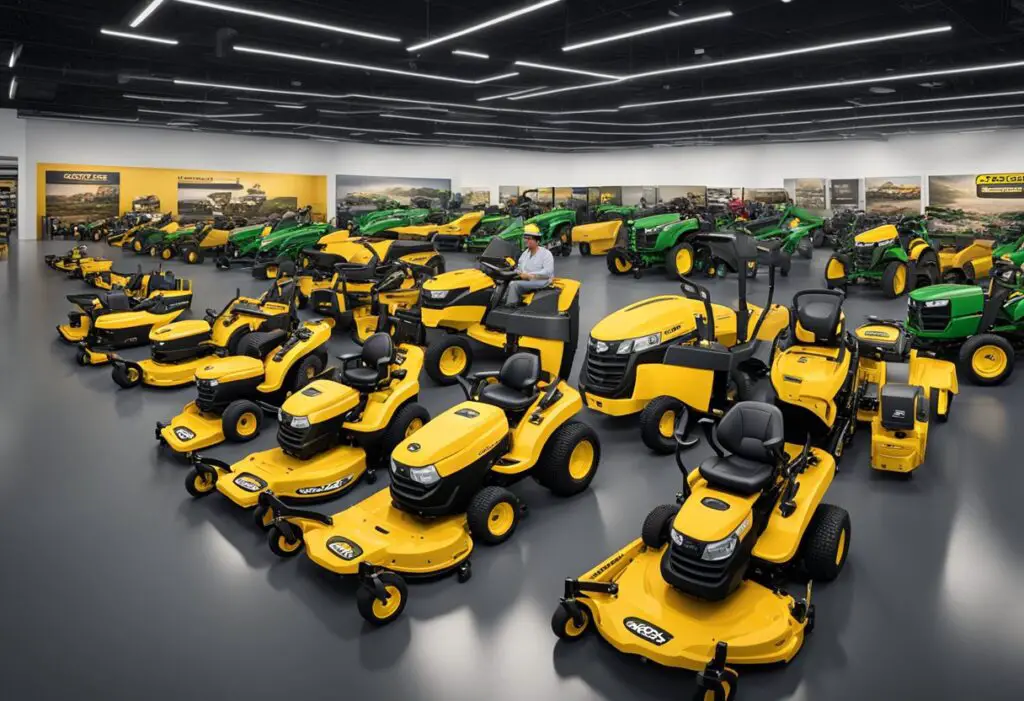
In the realm of zero-turn mowers, Cub Cadet and John Deere stand as titans in both history and repute. They’ve cultivated their standings over the years, offering a blend of reliability, quality, and durability that has won your trust.
Cub Cadet emerged in 1961, carving its niche as a company dedicated to the American spirit of lawn care. Its reputation for quality is built on a foundation of innovation, particularly in its pioneering zero-turn mowers with lap bar control systems, which you might appreciate for their precision.
| Cub Cadet | John Deere |
|---|---|
| Founded in 1961 | Founded in 1837 |
| Known for innovation | Emphasizes durability |
| Lap bar controls | Steering wheel controls |
Switching over to John Deere, you’re looking at a brand with a rich legacy dating back to 1837. It’s a name synonymous with durability. When you invest in a John Deere mower, you’re not just buying a piece of equipment; you’re owning a piece of steadfast Americana revered for its long-lasting performance.
Your choice between these brands may hinge on these historical reputations. If you desire a reliable workhorse, John Deere’s enduring presence in the market might seem reassuring. On the other hand, if innovative features and controlled operation are up your alley, Cub Cadet could be your go-to. Either way, you’re backed by years of trusted quality that continues to evolve in your quest for the perfect lawn.
Range of Models
When you’re in the market for a lawn mower, understanding the variety each brand offers ensures you find the perfect match for your lawn care needs.
Zero-Turn Mower Features
Cub Cadet’s Zero-Turn mowers boast innovative AeroForce technology which provides a precise and clean cut. On the other hand, John Deere offers a wide selection with different models catering to both residential and commercial needs, featuring prices that range from $4,000 to $8,000.
Riding Mower Variety
For riding mowers, John Deere’s variety spans across several models and price points, reflecting their broader market approach. Cub Cadet’s riding mowers come at a generally lower price, with models such as the ZT146 starting at $3,699.
Lawn Tractor Offerings
Both brands present an array of lawn tractors. Cub Cadet’s range is perceived as more budget-friendly, while John Deere’s lineup, including features such as comfortable seats and user-friendly controls, may come at a premium.
Push Mowers Line-up
Cub Cadet or John Deere’s push mowers may not be as abundant as their riding counterparts, but they are crafted to cater to smaller lawn areas, offering a practical solution without the need for larger equipment.
Performance and Power
When comparing Cub Cadet and John Deere zero turn mowers, the aspects of performance and power are front and center. Here’s what you need to know about their engine capabilities, cutting performance, and how they handle on your lawn.
Engine Capabilities
John Deere zero turn mowers are known for their strong V-twin engines, which typically provide higher horsepower and torque, translating to better performance, especially under heavy usage. They often boast engines that can deliver between 21hp to 25hp, ideal for tackling various landscaping challenges.
Cub Cadet mowers, while also offering a range of engine powers, may have less horsepower compared to John Deere models, which can influence their capability to handle prolonged or more demanding mowing tasks.
Cutting Performance
Your mower’s cutting performance is largely dictated by the power of its engine. John Deere’s higher horsepower engines enable efficient and clean cuts, even on tougher grass varieties. This can mean a shorter mowing time and reduced strain on the machine, leading to longer engine life.
Cub Cadet’s mowers generally provide precise control with their lap bar system. This level of control can contribute to a more uniform cut, especially when maneuvering around obstacles or landscaping features.
Handling and Stability
Handling and stability in a zero turn mower contribute greatly to the overall mowing experience.
John Deere mowers usually feature a steering wheel control system, which can provide a more intuitive driving experience, particularly for those familiar with traditional riding mowers. This system can also contribute to better stability on slopes and uneven terrain.
Cub Cadet mowers, with their lap bar control system, offer you a traditional zero turn experience. This can lead to excellent maneuverability and precise speed control, which is crucial for maintaining performance and power without compromising on stability.
Cutting Efficiency and Quality
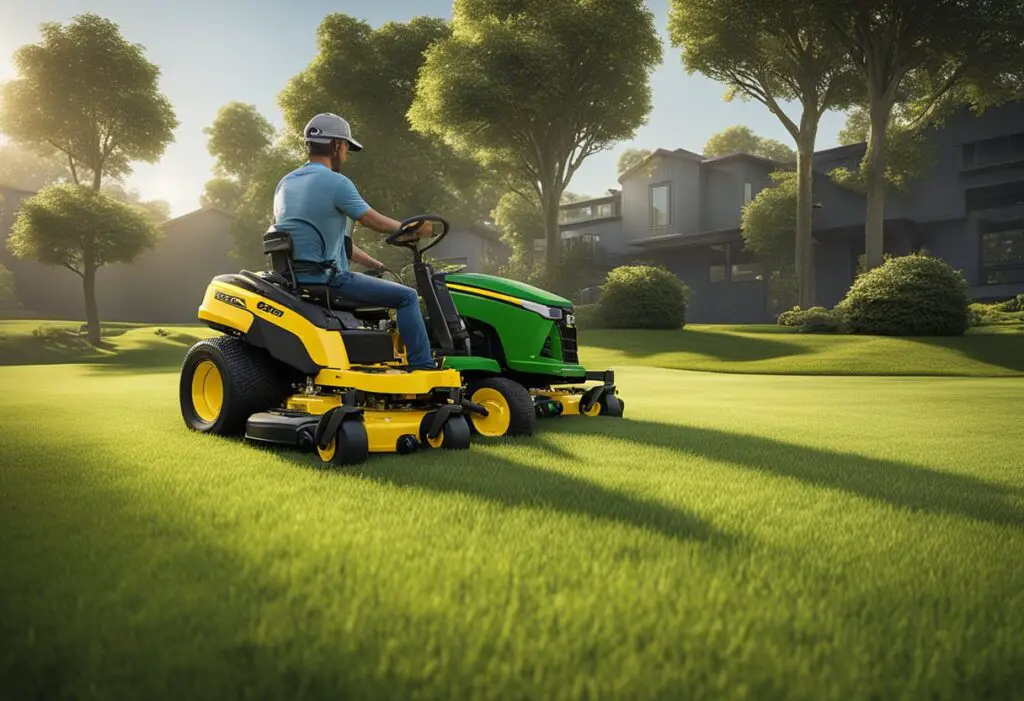
When you’re deciding on a zero-turn mower, your primary concern is often how well it cuts. You want a combination of precision, speed, and a quality finish that leaves your lawn looking professionally manicured.
Cutting Deck Innovations
Cub Cadet has introduced their AeroForce cutting deck, designed with optimized airflow to enhance the cutting and bagging performance. This also means reduced clumping and a more even cut with their trademarked high-lift blades, which create a finer mulch and better vacuum for picking up grass clippings.
- Cutting Deck Comparison
- Cub Cadet: Aeroforce Deck, promotes cleaner, finer cuts.
- John Deere: Accel Deep Deck, known for deep, clean, and comprehensive cuts.
John Deere isn’t far behind in innovation. Their Accel Deep deck is engineered for greater lift of grass for a finer cut. Both brands focus on the aerodynamics of the deck to ensure that every pass you make counts towards a beautiful, uniform lawn.
Mulching and Clipping Management
Your zero-turn mower’s ability to handle clippings affects the end look of your lawn. With Cub Cadet, the AeroForce deck combined with their high-lift blades creates a cutting action that finely dices clippings and reintroduces them back to the soil as mulch. This promotes healthier grass growth by naturally fertilizing the lawn.
John Deere, on the other hand, offers multiple attachment options for handling clippings, whether you prefer to mulch, bag, or discharge them. Their cutting blades are also designed to work efficiently with these attachments, ensuring that you have a clean lawn with minimal effort on your part.
- Clipping Management Features
- Cub Cadet: High-lift blades facilitating fine mulching.
- John Deere: Versatile attachment options for mulching, bagging or discharge.
Both zero-turn mower brands have worked on their cutting efficiency. You should find that they cater to the high standards of lawn care you’re after, with the added benefit of advanced mulching and clipping techniques which keep your lawn healthy and aesthetically pleasing.
Comfort and Usability
When it comes to choosing a zero-turn mower, you’ll find that comfort and usability are key aspects of a pleasant mowing experience. Both Cub Cadet and John Deere have put thought into the design of their mowers, ensuring that you have a comfortable ride and control system that’s easy to use.
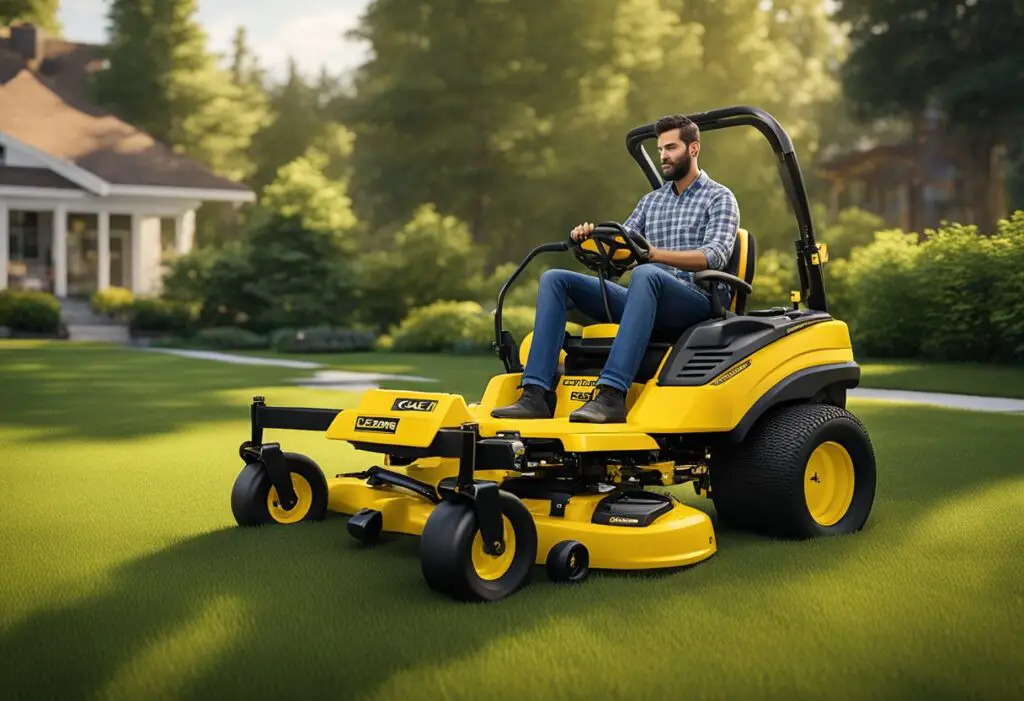
Ergonomic Controls
Cub Cadet zero-turn mowers come with a lap bar control system. This traditional approach provides you with precise control over your mower’s speed and direction, thanks to its ergonomic design. On the other hand, John Deere opts for a steering wheel control system. This user-friendly design can feel more intuitive if you’re accustomed to driving a car and may reduce the learning curve associated with operating the mower.
- Cub Cadet: Lap bar control system — precise maneuverability.
- John Deere: Steering wheel control system — familiar and intuitive.
Seating and Ride Comfort
Your comfort is paramount during long mowing sessions, and both brands offer features to enhance this. Cub Cadet and John Deere equip their mowers with high-back seats that provide support and coziness. Look for models with armrests for additional comfort—these small touches can make a big difference in reducing fatigue.
- Cub Cadet seats: High-back designs for support, optional armrests on higher-end models.
- John Deere seats: Cozy seating with high-back seats, armrests available across various models.
Ease of Control and Maneuverability
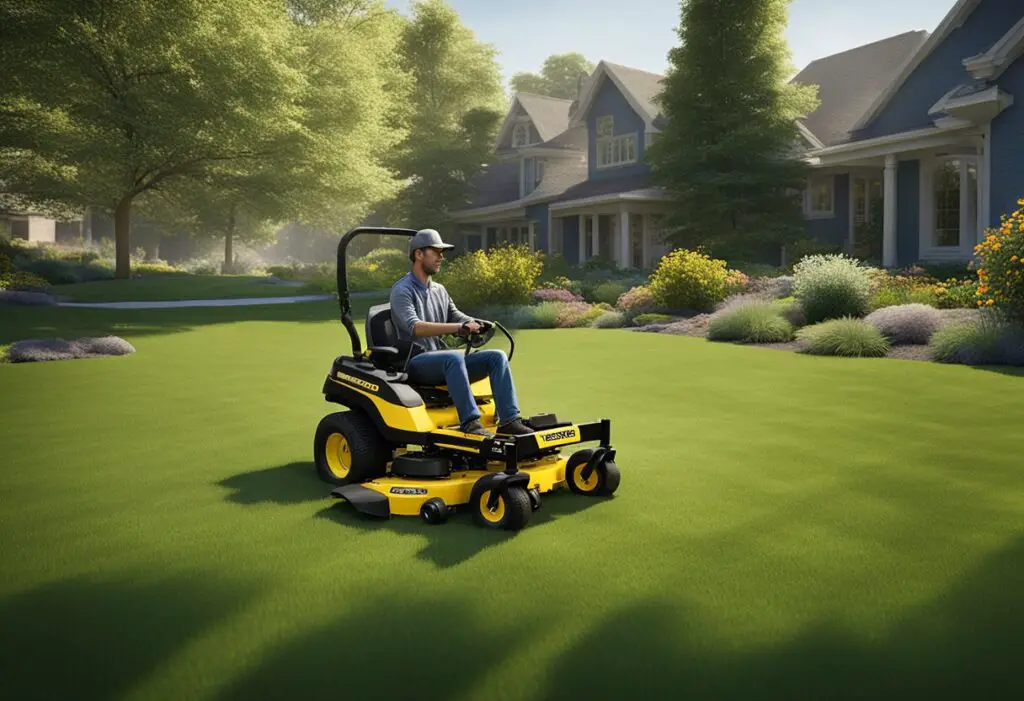
When you’re navigating your lawn with a zero-turn mower, control and maneuverability are vital for a smooth mowing experience. Different steering systems and varying turning capabilities help determine how effectively you can guide your mower around obstacles and through tight spaces.
Steering Systems
Cub Cadet Zero-Turn Mowers: Your Cub Cadet will likely be equipped with a lap bar control system. This traditional method allows for precise control – the more you push the bars, the faster the mower goes. If you’re more accustomed to the ebb and flow of a standard mower, this could feel familiar and intuitive to you.
John Deere Zero-Turn Mowers: On a John Deere, you’ll typically find a steering wheel control system. This option mimics the steering mechanism of a car and can be more comfortable for some users, especially if you’re looking for greater stability across various terrains. It can also be a more instinctive experience for new users transferring from a car to a mower.
Turning Radius and Maneuvering
Turning Radius: Zero-turn mowers boast an impressive ability to pivot 180 degrees without the need for additional space. This means both Cub Cadet and John Deere models offer excellent turning capabilities, allowing you to easily cut around obstacles and change directions with minimal effort.
Maneuverability:
- Cub Cadet: The lap bar system in Cub Cadet mowers empowers you with agile navigation, enabling precision when maneuvering around things like garden beds or trees.
- John Deere: Although steering wheels can make for smooth and comfortable handling, especially with foot pedal adjustments, they may not provide the same level of nimbleness as a lap bar when it comes to rapid turns.
Both Cub Cadet and John Deere zero-turn mowers offer distinct operating experiences. Your choice might come down to which type of control system best aligns with your comfort and the landscape you’re tending to.
Maintenance and Durability
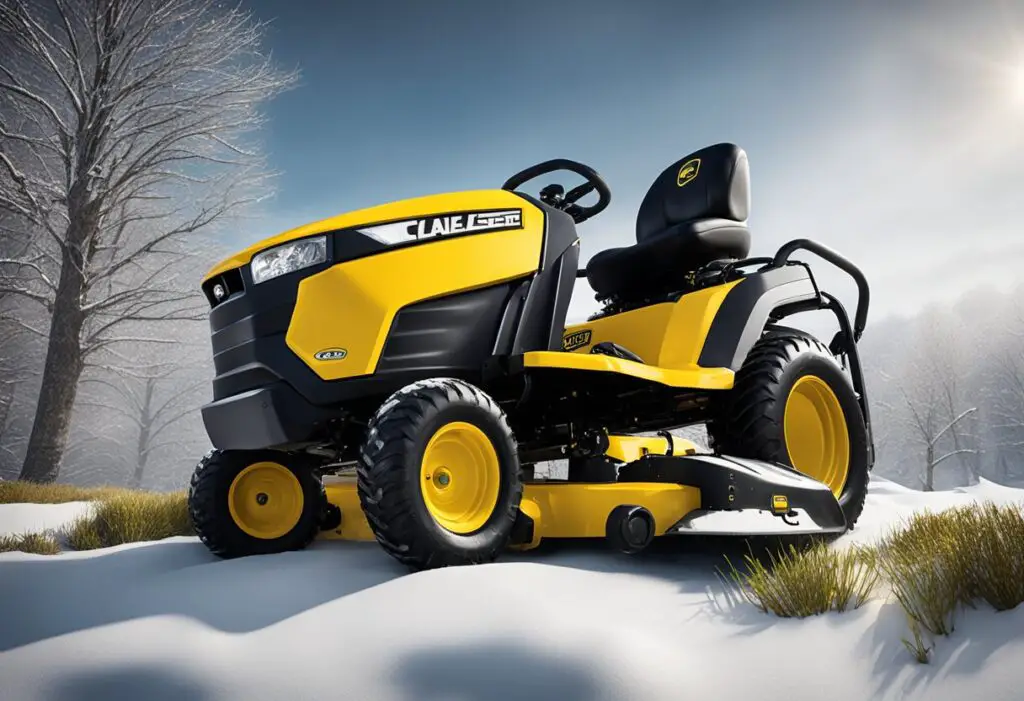
When considering a zero-turn mower, how long it lasts and how easy it is to maintain can be just as important as how it cuts. John Deere and Cub Cadet have specific maintenance features and warranties that enhance their longevity and reliability.
Service Intervals and Warranty
John Deere
- Service Intervals: Your maintenance schedule will typically include regular oil changes, and John Deere mowers often come with an external oil filter for easier access and serviceability.
- Warranty: The warranties for John Deere zero-turn mowers can be quite extensive, reflecting the brand’s commitment to durability. For instance, a given model may offer a 4-year/500-hour bumper-to-bumper warranty, but always check the specific terms for the model you’re interested in.
Cub Cadet
- Service Intervals: Similar to John Deere, Cub Cadet zero-turn mowers require standard maintenance like oil changes. Their engines are designed to make these tasks straightforward, often not requiring special tools.
- Warranty: Cub Cadet is known for competitive warranties as well, possibly offering a 3-year/unlimited-hour warranty with 5-year chassis and front axle coverage. Be sure to confirm this with the seller for the model you consider.
Longevity and Build Quality
John Deere
- Longevity: Strong engines and precision engineering contribute to the longevity of John Deere mowers. Heavy-use models may feature a welded deck as opposed to a stamped one, which can add to their lifespan.
- Build Quality: Known for their sturdy construction, John Deere mowers’ reliability is often reflected in their higher cost. Features that contribute to this include larger fuel tanks and heavy-duty frames.
Cub Cadet
- Longevity: Cub Cadet mowers are built to be durable, but how you use and maintain your mower will influence its longevity. Models with a welded deck are likely to withstand wear better than those with stamped decks.
- Build Quality: The build of Cub Cadet mowers generally focuses on delivering value, making them a more budget-friendly option without significantly compromising on quality. They strike a balance between performance and affordability.
Additional Features and Accessories
When choosing between Cub Cadet and John Deere zero-turn lawn mowers, you’ll find that both offer a range of additional features and accessories designed to enhance your mowing experience. From convenience to safety, these added elements make lawn maintenance easier and more efficient for you.
Convenience Features
Cub Cadet:
- Foot Lift: Easily raise and lower the cutting deck to maneuver over obstacles or transport your mower with the convenient foot-operated lift.
- Hour Meter: Track maintenance intervals with an integrated hour meter, helping you keep your mower in optimal condition.
John Deere:
- Mulching Kit: Convert grass clippings into mulch with an optional mulching kit, which can both nourish your lawn and reduce cleanup.
- Rubber Floor Mats: Experience enhanced comfort and reduced vibration during operation with rubber floor mats.
Safety and Protection
Cub Cadet:
- The lap bar control system not only offers precision but also ensures you’re securely in command of the mower, reducing the chances of accidental direction shifts.
John Deere:
- A steering wheel control system provides a familiar car-like feel that can improve stability and control, contributing to overall safety while mowing.
Pricing and Value
When considering a zero-turn mower, you’ll naturally evaluate the purchase from a cost perspective. Two critical aspects to consider are the initial investment you’ll make and the ongoing costs tied to usage and maintenance.
Initial Cost and Affordability
Cub Cadet mowers are generally more affordable with the ZT1 42 model priced at around $3,699. John Deere mowers have a starting point with the Z515E at $6,146, which doesn’t include the mulching kit. If your budget is tight, Cub Cadet may appear to be the clear winner; however, affordability extends beyond the sticker price.
John Deere
- Z515E: Starts at $6,146
Cub Cadet
- ZT1 42: Starts at $3,699
Cost of Ownership and Operation
Over time, a mower’s value is affected by its durability, reliability, and fuel efficiency. John Deere mowers, like the Z375R, are known for fuel efficiency and engine durability—factors that contribute to lower operational costs in the long run.
For professional landscapers or those with large properties, fuel efficiency and the ability to handle prolonged use can tip the scales in favor of a somewhat higher initial investment. With that in mind, tallying up the cost of ownership for a mower involves a long-term view of both savings and performance.
Note: The prices of mowers are subject to change and may vary by dealer or region.
Final Thoughts
When you’re deciding between a Cub Cadet and a John Deere zero-turn mower, your choice can often come down to your specific needs. Both brands have established a strong reputation, offering a variety of models to suit different preferences and lawns.
Cub Cadet mowers:
- Generally more affordable.
- Innovative AeroForce technology for enhanced cutting performance.
John Deere models:
- Offer a wider range of deck sizes for greater versatility.
- Positioned at a higher price point, reflecting premium options.
Upon examining the characteristics unique to each, consider the following factors:
- Budget: Your budget may lean you toward Cub Cadet zero-turn mowers for their competitive pricing.
- Lawn Size: For larger estates, a wider deck size offered by John Deere may contribute to efficiency and fewer passes.
- Cut Quality: For a more precise, cleaner cut, Cub Cadet’s Aeroforce Cutting System might be your preferred choice.
Remember, each riding mower will bring its distinct features to the table. You may prioritize affordability, versatility in cutting width, or specific cutting technology. In the end, your decision should align with what works best for your lawn and your personal preferences in a zero-turn mower.
Frequently Asked Questions
When it comes to zero-turn mowers, you might be choosing between Cub Cadet and John Deere. These FAQs will touch on differences in specifications, durability, warranties, value, customer reviews, and the pros and cons for both residential and commercial use.
What are the main differences in specifications between Cub Cadet and John Deere zero-turn mowers?
Cub Cadet mowers typically feature a lap bar control system, which can provide precise control, while John Deere models commonly use a steering wheel control system. Engines and price points vary between the two, with Cub Cadet models often being more budget-friendly.
How do Cub Cadet zero-turn mowers compare in durability and performance to John Deere’s?
John Deere zero-turn mowers are known for their robust engines, ensuring longevity and power, beneficial for heavy use. Cub Cadet offers competitive mowers with a reputation for good performance, but John Deere might have an edge in engine durability.
What warranties do Cub Cadet and John Deere offer for their zero-turn mowers?
Both brands offer warranties for their mowers, but the terms can vary. It’s important to check the latest warranty information for the specific model you’re considering, as these can change and might differ by region.
Which brand offers more value for money in their zero-turn mower lineup, Cub Cadet or John Deere?
Cub Cadet is generally less expensive than John Deere, with a range of prices to fit different budgets. However, value also includes factors like longevity and efficiency, where John Deere’s higher initial investment might be justified.
How do customer reviews rate Cub Cadet and John Deere zero-turn mowers for residential use?
Customer reviews often show a high level of satisfaction for both brands. Specific preferences for control systems, ease of use, and maintenance can influence whether a Cub Cadet or John Deere is better for your residential needs.
What are the pros and cons of commercial zero-turn mowers from Cub Cadet and John Deere?
Commercial mowers from John Deere are built for extensive use, offering features tailored for professional landscapers. Cub Cadet commercial mowers are reliable and can provide a more cost-effective solution. The decision between the two will depend on your specific commercial requirements.
